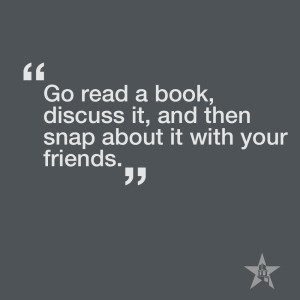If there’s one unarguable fact about the digital age, it is that images dominate our lives. Every day we’re bombarded by advertisements, Snapchats, Instagram notifications—an unstemmed tide of visual narrative. If you’ve ever taken a class with Professor Dave Huth, you’ve undoubtedly heard what opponents of our image-saturated age think of this flood of images; how they destroy our culture, decrease social capital and interaction, and ultimately make us a bunch of gibbering idiots covered in x-pro filters.
 At this point, you’re either tired of hearing this argument, terrified that we’re all going to devolve into those chair people from Wall-E, or, like the skeptical Houghton postmodern that you are, you’ve decided that images can’t be the end of human intelligence. In a way, I identify with all three of these perspectives. On the one hand, I see what appears to be a rapid decline in what has classically been defined as ‘society.’
At this point, you’re either tired of hearing this argument, terrified that we’re all going to devolve into those chair people from Wall-E, or, like the skeptical Houghton postmodern that you are, you’ve decided that images can’t be the end of human intelligence. In a way, I identify with all three of these perspectives. On the one hand, I see what appears to be a rapid decline in what has classically been defined as ‘society.’
People statistically talk face-to-face less often, hang out in shorter increments, and on the face of it, literacy and basic common sense seem to have been pushed to the side by our new, selfie-stick-wielding, 24-hour-news-cycle-watching overlords. Recently, this hit me as, ironically enough, I watched the 1963 film Contempt by French director Jean –Luc Godard. Characters in the film consistently quoted from memory the likes of Dante, Virgil, and Homer. And not only did they quote, but they APPLIED what they quoted. The words that they committed to memory, astonishingly enough, impacted their lives.
Now, I don’t know about you, but I find that our culture can barely remember which 125 characters we sent five minutes ago, let alone a passage from Dante’s journey through the bowels of Hell. The likes of media critics would assert that this is due to our increased dependence on our televisions, phones, and computer screens and the resulting ‘death’ of word-based, literary culture. In short, when a phone or a computer becomes your primary means of information gathering, you condense your thought life into a measly 125 characters.
However, before we finish unplugging our routers, deleting our contacts, and in some case (I see you, Neil Postman) fashioning tinfoil hats, I urge consideration of a blended co-existence with technology. While the dangers of technological dependence are well-documented, albeit highly contested, the benefits are often overlooked. Through computing power, we can create twice as fast, reach an exponential number of people with our ideas, and pretty much do ten times the work that we normally could. For instance, the current business idea of the ‘lean startup’ would be largely impossible without the ability of a small staff to work efficiently and effectively—two game-changing characteristics of technological improvement.
 In short, our tendencies are to create binaries—we can either have this or that, but not both. But that does not have to be the case in regards to our interactions with technology. If we foolishly allow ourselves to become entirely absorbed by yakking, snapping, and tweeting, we miss out on a significant portion of beneficial literary and interpersonal communication. Concurrently, if we focus only on the interpersonal and literary, we miss out on the benefits of mass communication, entirely disregarding the current trends of overlap between these two. Ultimately, by applying some self-control and a little creativity, the two often “opposing” parts of modern life can be brought together into a continuous whole.
In short, our tendencies are to create binaries—we can either have this or that, but not both. But that does not have to be the case in regards to our interactions with technology. If we foolishly allow ourselves to become entirely absorbed by yakking, snapping, and tweeting, we miss out on a significant portion of beneficial literary and interpersonal communication. Concurrently, if we focus only on the interpersonal and literary, we miss out on the benefits of mass communication, entirely disregarding the current trends of overlap between these two. Ultimately, by applying some self-control and a little creativity, the two often “opposing” parts of modern life can be brought together into a continuous whole.
So here’s my advice: go read a book, discuss it, and then snap about it with your friends. *
*(data and message rates may apply)

how would it be the end when it is still the start of capturing every happy moments of our live just like taking selfie’s using Selfie Stick Pro. 🙂